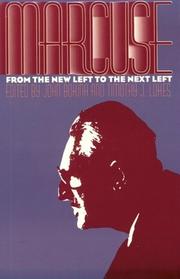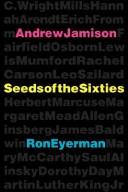| Listing 1 - 2 of 2 |
Sort by
|

ISBN: 0700606599 0700630732 Year: 1994 Publisher: Lawrence, Kan. University Press of Kansas
Abstract | Keywords | Export | Availability | Bookmark
 Loading...
Loading...Choose an application
- Reference Manager
- EndNote
- RefWorks (Direct export to RefWorks)
Marcuse brings back to center stage one of the most celebrated and controversial philosophers of the turbulent 1960s, the man Time magazine called the "guru of the New Left."In Reason and Revolution, Eros and Civilization, OneDimensional Man, and other notable works, Herbert Marcuse crystallized the essence of counterculture philosophy. His neoMarxist critique of Western capitalism was widely embraced by revolutionaries, "hippies," and an entire generation of academics who condemned political, economic, and sexual repression in American society. So complete was Marcuse's identification with the New Left that, with its demise, he and his works fell out of favor. But, as this volume persuasively demonstrates, Marcuse remains vitally relevant for us today.Returning to Marcuse may recall the clash of idealistic exuberance and tragic violence associated with Woodstock, HaightAshbury, the Vietnam War, 1968 Democratic Convention, Kent State, and Earth Day, as well as the passionate voices of antiwar and civil rights protesters, environmentalists, feminists, and free love advocates. But this volume does not cater to the simplistic nostalgia of aging babyboomers.Fifteen leading Marcuse scholars, including Marcuse's son Peter, assess the philosopher's ideas in the radically different theoretical and political contexts of the 1990s. The range of topics covered is distinctly contemporary—Foucault and postmodern theories, analytical Marxism and the demise of the Soviet Union, women's studies and feminist psychoanalytic theory, aesthetic consciousness and postmodern art, radical ecology and cybernetic technology—and includes Douglas Kellner's revealing first look at the unpublished manuscripts in the Marcuse Archives in Frankfurt.Sure to excite liberal as well as irritate conservative culture warriors, these provocative essays illuminate the outlines of a Marcuse revival and the Next Left as both emerge to confront the complex challenges of our times.
Marcuse, Herbert --- Contributions in political science --- Contributions in sociology --- Marcuse, Herbert, - 1898- - Contributions in political science. --- Marcuse, Herbert, - 1898- - Contributions in sociology. --- Sociology. --- Political science. --- Nya vänstern. --- Marcuse, Herbert, --- Marcuse, Herbert. --- Contributions in sociology. --- Contributions in political science. --- Administration --- Civil government --- Commonwealth, The --- Government --- Political theory --- Political thought --- Politics --- Science, Political --- Social sciences --- State, The --- Social theory --- Ma-erh-kʻu-sai, --- Mārkiyūz, Hirbirt, --- Markouze, Chermpert, --- Markuze, Herbert, --- Social & political philosophy --- Ma-erh-k�u-sai, --- M�arkiy�uz, Hirbirt, --- Maruk�uze, H., --- Maruk�uze, Heruberuto, --- Marukūze, H., --- Marukūze, Heruberuto,

ISBN: 0585249725 0520917162 9780520917163 9780585249728 0520085167 0520203410 Year: 1994 Publisher: Berkeley, California : University of California Press,
Abstract | Keywords | Export | Availability | Bookmark
 Loading...
Loading...Choose an application
- Reference Manager
- EndNote
- RefWorks (Direct export to RefWorks)
"The Sixties." The powerful images conveyed by those two words have become an enduring part of American cultural and political history. But where did Sixties radicalism come from? Who planted the intellectual seeds that brought it into being? These questions are answered with striking clarity in Andrew Jamison and Ron Eyerman's book. The result is a combination of history and biography that vividly portrays an entire culture in transition. The authors focus on specific individuals, each of whom in his or her distinctive way carried the ideas of the 1930s into the decades after World War II, and each of whom shared in inventing a new kind of intellectual partisanship. They begin with C. Wright Mills, Hannah Arendt, and Erich Fromm and show how their work linked the "old left" of the Thirties to the "new left" of the Sixties. Lewis Mumford, Rachel Carson, and Fairfield Osborn laid the groundwork for environmental activism; Herbert Marcuse, Margaret Mead, and Leo Szilard articulated opposition to the postwar "scientific-technological state." Alternatives to mass culture were proposed by Allen Ginsberg, James Baldwin, and Mary McCarthy; and Saul Alinsky, Dorothy Day, and Martin Luther King, Jr., made politics personal. This is an unusual book, written with an intimacy that brings to life both intellect and emotion. The portraits featured here clearly demonstrate that the transforming radicalism of the Sixties grew from the legacy of an earlier generation of thinkers. With a deep awareness of the historical trends in American culture, the authors show us the continuing relevance these partisan intellectuals have for our own age. "In a time colored by 'political correctness' and the ascendancy of market liberalism, it is well to remember the partisan intellectuals of the 1950s. They took sides and dissented without becoming dogmatic. May we be able to say the same about ourselves."--from Chapter 7.
NON-CLASSIFIABLE. --- United States --- Intellectual life --- Civilization --- 20th century america political history. --- 20th century american culture. --- 20th century american history. --- allen ginsberg. --- american culture. --- american history. --- c wright mills. --- dorothy day. --- environmental activism. --- erich fromm. --- fairfield osborn. --- hannah arendt. --- herbert marcuse. --- intellectual partisanship. --- james baldwin. --- leo szilard. --- lewis mumford. --- margaret mead. --- martin luther king jr. --- mary mccarthy. --- mass culture. --- old left. --- politics. --- rachel carson. --- radicalism. --- saul alinsky. --- scientific technological state.
| Listing 1 - 2 of 2 |
Sort by
|

 Search
Search Feedback
Feedback About UniCat
About UniCat  Help
Help News
News